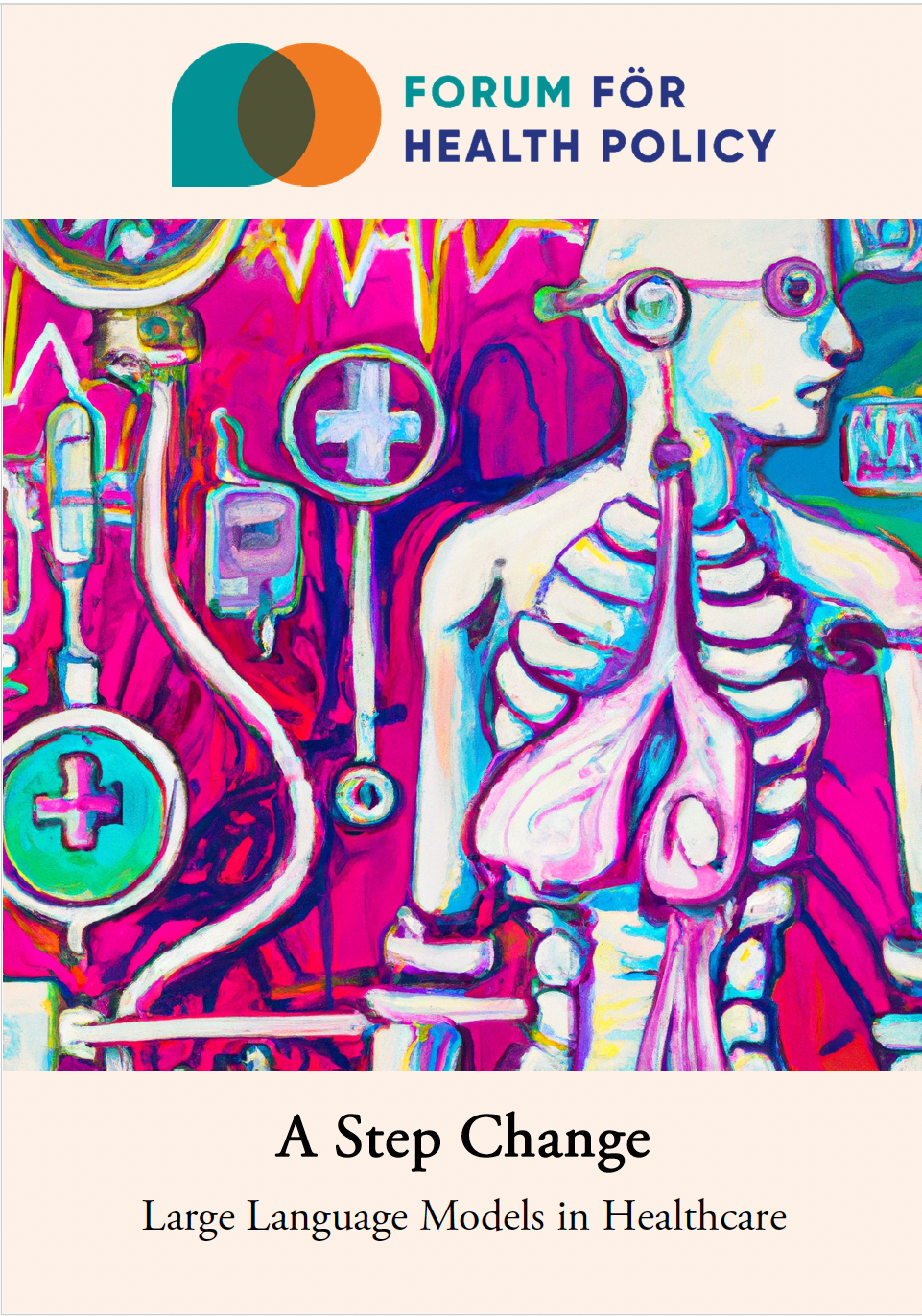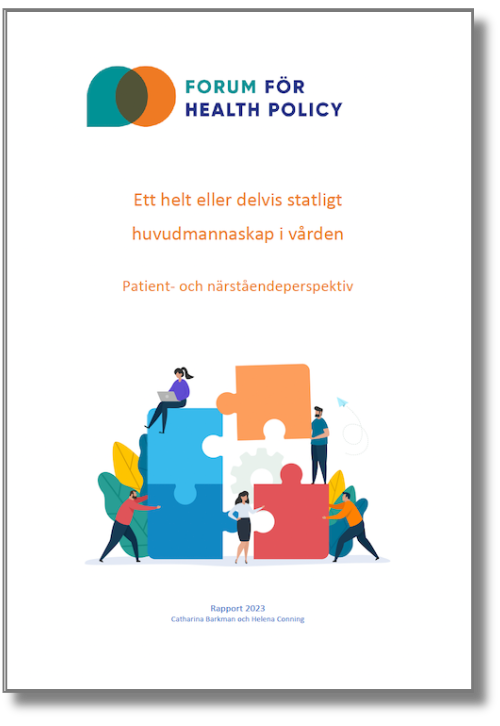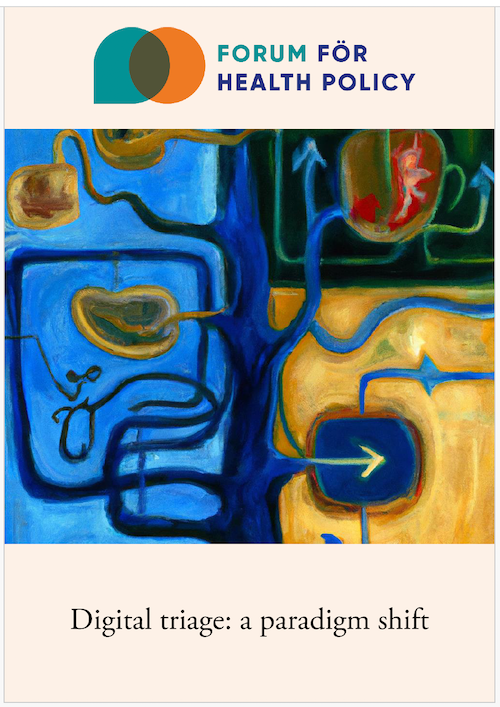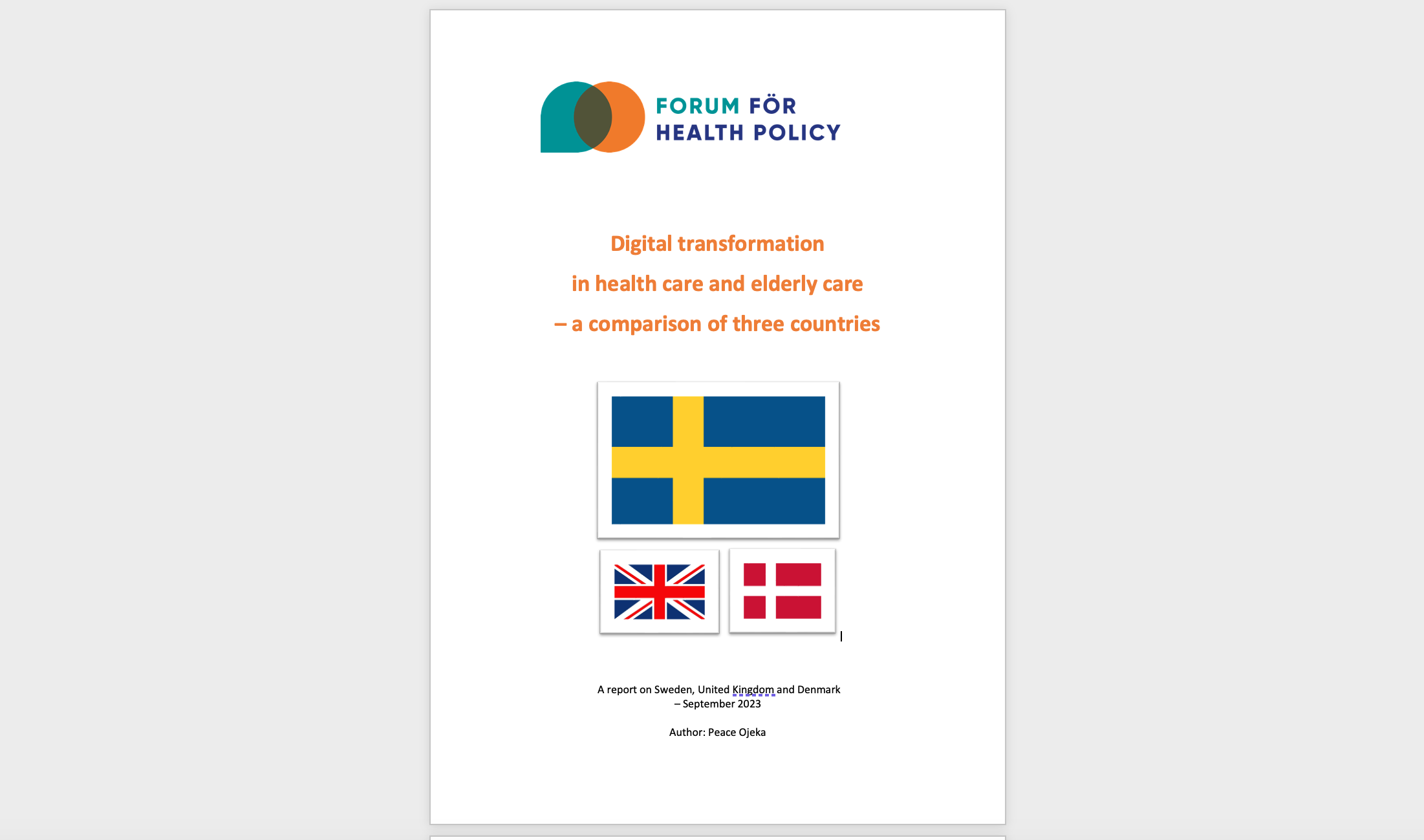Reports and Policy Briefs
Forum for Health Policy publishes policy briefs and recommendations in key areas in health care and elderly care. The three main areas are, Person-centered care Digitalization/innovation and Effectiveness. The texts include suggestions for action and particularly important advice to decision makers. Listed below are the reports (in English) as well as English summaries of Swedish reports with links to the full versions in Swedish.
A Step Change – Large Language Models in Healthcare
Author: Jonathan Ilicki, MD
Forum for Health Policy has invited Dr. Jonathan Ilicki to share his insights and experiences regarding the impact of AI in healthcare. This report sheds light on how AI could
enhance patient safety and offload healthcare staff, as well as what risks AI entails in healthcare, and aims to spark discussions about AI’s role in transforming healthcare.
A full or partial state responsibility for health care – patient and family perspective (In Swedish)
Authors: Catharina Barkman and Helena Conning, Forum for Health Policy. December 2023.
The purpose of this report is to highlight views from the patients’ perspective on the Swedish state’s role and responsibility for health care. Experienced patients/experts have contributed to the content and recommendations.
Digital triage – a paradigm shift
Author: Jonathan Ilicki, MD
Forum for Health Policy has asked Dr. Jonathan Ilicki to describe and reflect on digital triage as a way to improve patient safety and free up resources for care based on his experiences. Our hope is that the report creates debate and dialogue around digital triage. Please feel free to comment on the website or on social media. Many thanks to Jonathan.
The author is is report’s content and conclusions.
Digital transformation in health care and elderly care – a comparison of three countries
A report on Sweden, United Kingdom and Denmark – September 2023
Author: Peace Ojeka
In this report Forum for Health Policy gives a description of digital transformation in health care, specifically in Sweden, UK and Denmark. The report also gives some examples of how digital transformation are implemented in healthcare and elderly care in Sweden, UK and Denmark.
Summary Report, A comprehensive compilation of policy briefs
Summary
This report is a compilation of the English summaries of some of the policy reports and briefs published by Forum for Health Policy in 2017-2019. The aim of the report is to give English-speaking readers a brief overview and highlights of Forum’s activities, so as to reach a broader international public.
Mental illness – how to reverse the trend?
Summary
This policy brief presents a number of policy recommendations to meet society’s challenge with increasing mental health;
– Develop a long-term strategy with specific goals and sub-goals
– Speed up the preventive work in collaboration between different actors in society
– Develop the quality and scope of care
The recommendations are based on suggestions from experts, patient representatives, healthcare pro-viders, entrepreneurs, researchers and others who participated in Forum for Health Policy’s workshop on March 13, 2019. The paper also includes some examples on different ways of working for a better health.
Forum for Health Policy 2014-2018
Summary
This report summarises Forum for Health Policy’s activities during 2014-2018. Throughout the years Forum has arranged a large amount of events where different actors, national as well as international, have been discussing important health policy issues. The number of member organisations has grown to 17 at the end of 2018, several reports and policy briefs have been published, a research network established and a guest blog initiated, with more than 70 posts at the end of 2018. This and much more is presented in the report (in Swedish).
Healthcare online – possibilities and challenges
Summary
On October 2nd, 2018, the Forum for Health Policy (Forum) organized a workshop entitled “Health care online, possibilities and challenges. Over 80 people attended, representing patient associations, universities, counties, municipals, enterprises and health care providers. This brief provides a summary of presentations, discussions and recommendations that emerged during the workshop. It also includes a chapter on legislation and regulations as an obstacle for development and two interviews with caregivers about their experiences of incorporating digital care into their services.
Possibilities and challenges connected to online care were discussed from three perspectives; for patients/users, for health care staff and for the health care system as a whole. Increased accessibility, increased participation and equal care were some of the positive aspects raised from a patient and user perspective. Digital exclusion and risk of overdiagnosis were two of the challenges mentioned.
From a health care staff perspective well-functioning digital support was emphasized as a prerequisite for creating a more individualized, flexible and modern working environment. Also, automation of administration enables more time with the patients. Some believed that digital care could be perceived as threatening by employees as well as managers in traditional health care providers, and argued that there is a risk that digital care firms could lead to new information barriers and a shortage of knowledge.
Several positive aspects for the entire system were emphasized, not least increased efficiency and productivity and improved opportunities for personalized care. At the same time, some believed that digital care could contribute to over-consumption and a non- effective use of resources. The participants also highlighted the need to update and adapt reimbursement systems, laws and regulations to new technology.
During the workshop, participants were asked what recommendations they would like to give to politicians in order for modern digital technology to be utilized in the best possible way. Based on the discussions, Forum for Health Policy recommend politicians, on a national and regional level, the following:
• Create a vision for a modern health care system where digital technology is a natural integrated part.
• Change perspective from organization to people.
• Develop and adapt reimbursement systems.
• Use digital technology to create modern working methods.
• Modernize legislation.
Policy changes needed to improve health care
Summary
In conjunction with Almedalen 2018 (a yearly event that gathers political parties, organisations, companies and citizens to discuss Swedish politics and societal issues) and the forthcoming election, Forum for Health Policy published a report and an article for the Swedish newspaper SVD on Swedish healthcare policy. The main message is that Swedish healthcare is in need of a political leadership that understands the urgency of effective reforms, so that the healthcare system can be adapted to the rapid technological development that is now taking place. Otherwise, there is a risk that innovation will be hampered when it is most needed.
Study trip to England 2018 (in English and Swedish)
Summary
In the end of April a delegation from Forum for Health Policy travelled to England to meet with the well renowned think tanks Nuffield Trust and the Health Foundation. The delegation also visited the nurse led practice Cuckoo Lane Practice and online doctor Babylon Health. In this report we publish an interviews with Health Foundation´s Tim Gardner and with Cuckoo Lane Practice´s Julie Belton, as well as a blog by the founder of Babylon Health, Ali Parsa (introductions and summaries are in Swedish, but interviews in English).
Successes and barriers for innovation in healthcare (in English)
Summary
What are the barriers for innovation in healthcare, what makes it successful and what can we learn from each other? These were the main issues on an exclusive seminar, organised by Forum for Health Policy on the 7th of March, in collabora- tion with the embassies and chambers of commerce of the Netherlands and Switzerland.
Innovation in healthcare is necessary to successfully provide healthcare at a lower cost with higher quality for an increasing number of patients. In Europe, each coun- try has its own healthcare and innovation system with different characteristics, but they often face similar problems – technological, sociological, systemic and legal. Patients and patient associations are engaged in innovation, entrepreneurs are ea- ger to participate and improve the system and many healthcare systems try new ways of stimulating innovation.
During the seminar researchers, entrepreneurs, patient representatives and officials from all three countries were invited to give their view on innovation in healthcare from their experiences and different perspectives.
A common denominator, irrespective of whose perspective, is that more cooperation is required. Patients want to be more actively involved in innovation processes, entrepreneurs need closer contacts with both clinics and patients in order to design products and services according to needs and health care providers need the ex- pertise and knowledge from both entrepreneurs and patients. On an organisational level it is clear that the system is lagging behind and needs to be modernised, for example when it comes to regulations and reimbursement systems. There is also a need for more coordination and a systematic approach to both the innovation and the implementation process.
Policy recommendations:
Strengthen dialogue and collaboration between different actors
Involve patients in innovation and implementation
Enhance reimbursement systems
Strengthen the IT infrastructure
Facilitate clinical trials
Use innovation and new technologies to focus more on prevention
Make it easier for healthcare and entrepreneurs to work together
What can Sweden learn from the Netherlands and Switzerland? (in Swedish)
Summary
To compare is to learn and to develop. Benchmarking between various health care organisations is of great value in order to pinpoint areas of improvement. On the 19th of February 2017 Forum for Health Policy arranged a workshop in collaboration with the Embassies and Chambers of Commerce for the Netherlands and Switzerland with the topic of what we can learn from each other. Ines Coppoolse, Ambassador, Nether- lands and Christian Schoenenberger, Ambassador, Switzerland opened the workshop by welcoming the speakers and the audience. Anders Morin, vice chairman of Forum, gave an extensive presentation with comparisons of quality, costs, accessibility, patient involvement etc. from various sources (OECD, European Health Consumer Index, Common Wealth Fund etc.). ere are three main areas where Sweden is falling back; accessibility, coordination in health care and patient involvement. Professor Niko- la Biller-Andorno from the University of Zürich and Professor Patrick Jeurrisen from the Radboud University of Netherlands presented features and current challenges from the two countries. e panel consisted of representatives with deep knowledge of health care. Many important issues were being discussed, for example the coordination of health care, patient involvement and insurance companies’ roles on the health care market. Peter Graf, chairman of Forum for Health Policy, closed the seminar by stressing the importance of learning from each other.
Integrated health and social care (in Swedish)
Summary
There are about one million individuals in Sweden (approximately 10% of the population) that have several simultaneous health care needs, and who also have reduced capacity to coordinate their own health and care services. While many of these individuals receive care from informal caregivers – typically family members or neighbors – coordinating services for patients remains a major challenge for the health and care services. Cur- rently, counties are in charge of health care and municipalities are in charge of care of elderly. Both are more focused on single operations than on people with more complex and extensive needs. For these, it is of utmost importance that the services are matched well. Insu cient coordination is detrimental to patients, and lowers the quality of care or care services. ese shortcomings might also lead to higher costs, for example due to un- necessary repetitions of treatments or examinations. Forum for Health Policy has pointed out this important issue for many years.
On the 13th of February 2017 Forum for Health Policy arranged a workshop on ”E cient coordinated health care and social services. Is it possible?” It was attended by more than 100 participants including patient representatives, politicians, trade unions, administrators in leading positions, health care organisations and elder care organisa- tions, researchers and others. In-depth discussions focused on key recommendations for improving coordination between counties and municipalities. A follow-up round- table discussion took place on the 7th of March to analyse the discussions from the work- shop. Based on the conclusions from the workshop, the roundtable discussions, as well as valuable input from our research network, Forum draws the following ve recommendations. Some of the recommendations are general while others are more speci c. However, all of them are essential in order to improve e ciency in coordinating health care and elderly care.
• Make it possible for the patients to choose between private and public caregivers who organise both health care and social services.
• Enhance reimbursement systems with incentives for integration of care and social services are needed that support the patient’s needs.
• Strengthen the IT infrastructure to facilitate information and communication be- tween health care providers as well as between health care providers and elderly care. Make it easier for eHealth entrepreneurs to share and develop new ideas that improve patients’ care.
• Implement mobile health care teams to a larger extent than today, preferably in a close cooperation between counties and municipalities.
• Improve the patient discharge process from elective care at the hospitals (where the counties are responsible) to the elderly care (where the local municipalities are responsible).
Big Data (in Swedish)
Summary
The amount of data we routinely generate and collect in every day life has increased rapidly as well as our ability to use technology to analyze and understand it. The intersection of these trends is what we call “Big Data”. Using big data in the development of health care holds out the promise of major advance in the day-to-day operational dimensions of clinical procedures, pharmaceutical dosing, preventive health strategies and social care development. These new data capabilities also, however, trigger fears among individual patients and citizens that their personal data will be misused and/or made public.
The value of Big Data in healthcare and the challenges concerning privacy and integrity was discussed at a workshop organized by Forum for Health Policy and the Swedish Agency for Health and Care Services Analysis in September 2016.
Several interesting presentations shed light on various aspects. e keynote speaker Peeter Ross, professor of e-health of Tallinn University of Technology presented an overview of the development in Estonia. is Baltic country has been at the forefront of developing a single national electronic medical record system that meets di cult security and trust conditions. Individual citizens have direct immediate access to the electronic medical record over the internet and they must explicitly approve each in- dividual or organization that is given access to their information. e same individual electronic record, because it is attached to a national electronic backbone (the so-called “X-Road”), enables individuals to vote electronically in elections etc.
The Swedish Agency for Health and Care Services Analysis underlined that more know- ledge is needed about how patients, users and citizens perceive and relate to privacy issues. A survey on the topic will be presented in mid 2017.
Several recommendations can be made for successful use of big data in the digitalization of health care in Sweden. These include:
• A regionally coordinated e ort
• Strong leadership
• Targeted use of private sector capacities
• Improvement of quality assurance
• Improvement in focus on patient’s needs, privacy and preferences • Increased cooperation on European and international level
More policy briefs (in Swedish):
Comorbidity (in Swedish)
Variations (in Swedish)
Team (in Swedish)
Public health (in Swedish)
18 good advice (in Swedish)



